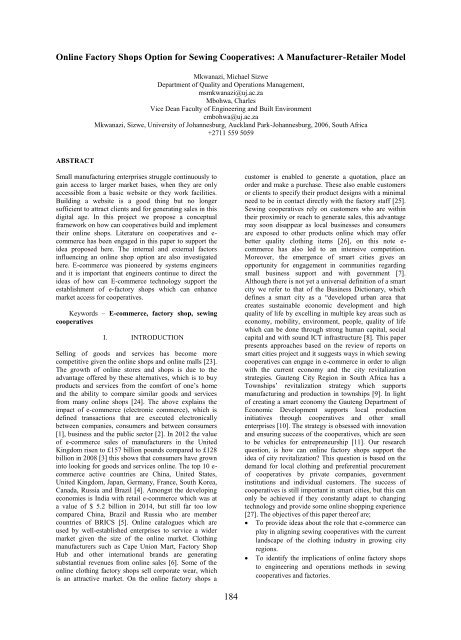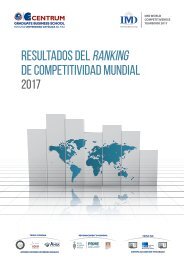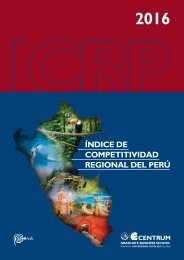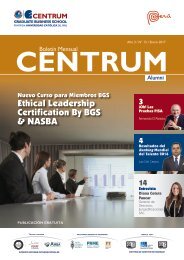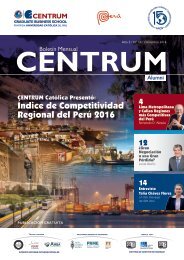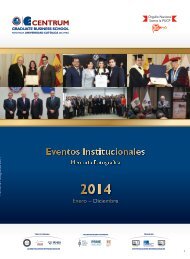Pan-Pacific Conference XXXIV. Designing New Business Models in Developing Economies
This publication represents the Proceedings of the 34th Annual Pan-Pacific Conference being held in Lima, Peru May 29-31, 2017. The Pan-Pacific Conference has served as an important forum for the exchange of ideas and information for promoting understanding and cooperation among the peoples of the world since 1984. Last year, we had a memorable conference in Miri, Malaysia, in cooperation with Curtin University Sarawak, under the theme of “Building a Smart Society through Innovation and Co-creation.” Professor Pauline Ho served as Chair of the Local Organizing Committee, with strong leadership support of Pro Vice-Chancellor Professor Jim Mienczakowski and Dean Jonathan Winterton.
This publication represents the Proceedings of the 34th Annual Pan-Pacific Conference being held in Lima, Peru May 29-31, 2017. The Pan-Pacific Conference has served as an important forum for the exchange of ideas and information for promoting understanding and cooperation among the peoples of the world since 1984. Last year, we had a memorable conference in Miri, Malaysia, in cooperation with Curtin University Sarawak, under the theme of “Building a Smart Society through Innovation and Co-creation.” Professor Pauline Ho served as Chair of the Local Organizing Committee, with strong leadership support of Pro Vice-Chancellor Professor Jim Mienczakowski and Dean Jonathan Winterton.
You also want an ePaper? Increase the reach of your titles
YUMPU automatically turns print PDFs into web optimized ePapers that Google loves.
Onl<strong>in</strong>e Factory Shops Option for Sew<strong>in</strong>g Cooperatives: A Manufacturer-Retailer Model<br />
Mkwanazi, Michael Sizwe<br />
Department of Quality and Operations Management,<br />
msmkwanazi@uj.ac.za<br />
Mbohwa, Charles<br />
Vice Dean Faculty of Eng<strong>in</strong>eer<strong>in</strong>g and Built Environment<br />
cmbohwa@uj.ac.za<br />
Mkwanazi, Sizwe, University of Johannesburg, Auckland Park-Johannesburg, 2006, South Africa<br />
+2711 559 5059<br />
ABSTRACT<br />
Small manufactur<strong>in</strong>g enterprises struggle cont<strong>in</strong>uously to<br />
ga<strong>in</strong> access to larger market bases, when they are only<br />
accessible from a basic website or they work facilities.<br />
Build<strong>in</strong>g a website is a good th<strong>in</strong>g but no longer<br />
sufficient to attract clients and for generat<strong>in</strong>g sales <strong>in</strong> this<br />
digital age. In this project we propose a conceptual<br />
framework on how can cooperatives build and implement<br />
their onl<strong>in</strong>e shops. Literature on cooperatives and e-<br />
commerce has been engaged <strong>in</strong> this paper to support the<br />
idea proposed here. The <strong>in</strong>ternal and external factors<br />
<strong>in</strong>fluenc<strong>in</strong>g an onl<strong>in</strong>e shop option are also <strong>in</strong>vestigated<br />
here. E-commerce was pioneered by systems eng<strong>in</strong>eers<br />
and it is important that eng<strong>in</strong>eers cont<strong>in</strong>ue to direct the<br />
ideas of how can E-commerce technology support the<br />
establishment of e-factory shops which can enhance<br />
market access for cooperatives.<br />
Keywords – E-commerce, factory shop, sew<strong>in</strong>g<br />
cooperatives<br />
I. INTRODUCTION<br />
Sell<strong>in</strong>g of goods and services has become more<br />
competitive given the onl<strong>in</strong>e shops and onl<strong>in</strong>e malls [23].<br />
The growth of onl<strong>in</strong>e stores and shops is due to the<br />
advantage offered by these alternatives, which is to buy<br />
products and services from the comfort of one’s home<br />
and the ability to compare similar goods and services<br />
from many onl<strong>in</strong>e shops [24]. The above expla<strong>in</strong>s the<br />
impact of e-commerce (electronic commerce), which is<br />
def<strong>in</strong>ed transactions that are executed electronically<br />
between companies, consumers and between consumers<br />
[1], bus<strong>in</strong>ess and the public sector [2]. In 2012 the value<br />
of e-commerce sales of manufacturers <strong>in</strong> the United<br />
K<strong>in</strong>gdom risen to £157 billion pounds compared to £128<br />
billion <strong>in</strong> 2008 [3] this shows that consumers have grown<br />
<strong>in</strong>to look<strong>in</strong>g for goods and services onl<strong>in</strong>e. The top 10 e-<br />
commerce active countries are Ch<strong>in</strong>a, United States,<br />
United K<strong>in</strong>gdom, Japan, Germany, France, South Korea,<br />
Canada, Russia and Brazil [4]. Amongst the develop<strong>in</strong>g<br />
economies is India with retail e-commerce which was at<br />
a value of $ 5.2 billion <strong>in</strong> 2014, but still far too low<br />
compared Ch<strong>in</strong>a, Brazil and Russia who are member<br />
countries of BRICS [5]. Onl<strong>in</strong>e catalogues which are<br />
used by well-established enterprises to service a wider<br />
market given the size of the onl<strong>in</strong>e market. Cloth<strong>in</strong>g<br />
manufacturers such as Cape Union Mart, Factory Shop<br />
Hub and other <strong>in</strong>ternational brands are generat<strong>in</strong>g<br />
substantial revenues from onl<strong>in</strong>e sales [6]. Some of the<br />
onl<strong>in</strong>e cloth<strong>in</strong>g factory shops sell corporate wear, which<br />
is an attractive market. On the onl<strong>in</strong>e factory shops a<br />
customer is enabled to generate a quotation, place an<br />
order and make a purchase. These also enable customers<br />
or clients to specify their product designs with a m<strong>in</strong>imal<br />
need to be <strong>in</strong> contact directly with the factory staff [25].<br />
Sew<strong>in</strong>g cooperatives rely on customers who are with<strong>in</strong><br />
their proximity or reach to generate sales, this advantage<br />
may soon disappear as local bus<strong>in</strong>esses and consumers<br />
are exposed to other products onl<strong>in</strong>e which may offer<br />
better quality cloth<strong>in</strong>g items [26], on this note e-<br />
commerce has also led to an <strong>in</strong>tensive competition.<br />
Moreover, the emergence of smart cities gives an<br />
opportunity for engagement <strong>in</strong> communities regard<strong>in</strong>g<br />
small bus<strong>in</strong>ess support and with government [7].<br />
Although there is not yet a universal def<strong>in</strong>ition of a smart<br />
city we refer to that of the <strong>Bus<strong>in</strong>ess</strong> Dictionary, which<br />
def<strong>in</strong>es a smart city as a “developed urban area that<br />
creates susta<strong>in</strong>able economic development and high<br />
quality of life by excell<strong>in</strong>g <strong>in</strong> multiple key areas such as<br />
economy, mobility, environment, people, quality of life<br />
which can be done through strong human capital, social<br />
capital and with sound ICT <strong>in</strong>frastructure [8]. This paper<br />
presents approaches based on the review of reports on<br />
smart cities project and it suggests ways <strong>in</strong> which sew<strong>in</strong>g<br />
cooperatives can engage <strong>in</strong> e-commerce <strong>in</strong> order to align<br />
with the current economy and the city revitalization<br />
strategies. Gauteng City Region <strong>in</strong> South Africa has a<br />
Townships’ revitalization strategy which supports<br />
manufactur<strong>in</strong>g and production <strong>in</strong> townships [9]. In light<br />
of creat<strong>in</strong>g a smart economy the Gauteng Department of<br />
Economic Development supports local production<br />
<strong>in</strong>itiatives through cooperatives and other small<br />
enterprises [10]. The strategy is obsessed with <strong>in</strong>novation<br />
and ensur<strong>in</strong>g success of the cooperatives, which are seen<br />
to be vehicles for entrepreneurship [11]. Our research<br />
question, is how can onl<strong>in</strong>e factory shops support the<br />
idea of city revitalization? This question is based on the<br />
demand for local cloth<strong>in</strong>g and preferential procurement<br />
of cooperatives by private companies, government<br />
<strong>in</strong>stitutions and <strong>in</strong>dividual customers. The success of<br />
cooperatives is still important <strong>in</strong> smart cities, but this can<br />
only be achieved if they constantly adapt to chang<strong>in</strong>g<br />
technology and provide some onl<strong>in</strong>e shopp<strong>in</strong>g experience<br />
[27]. The objectives of this paper thereof are;<br />
To provide ideas about the role that e-commerce can<br />
play <strong>in</strong> align<strong>in</strong>g sew<strong>in</strong>g cooperatives with the current<br />
landscape of the cloth<strong>in</strong>g <strong>in</strong>dustry <strong>in</strong> grow<strong>in</strong>g city<br />
regions.<br />
To identify the implications of onl<strong>in</strong>e factory shops<br />
to eng<strong>in</strong>eer<strong>in</strong>g and operations methods <strong>in</strong> sew<strong>in</strong>g<br />
cooperatives and factories.<br />
184


